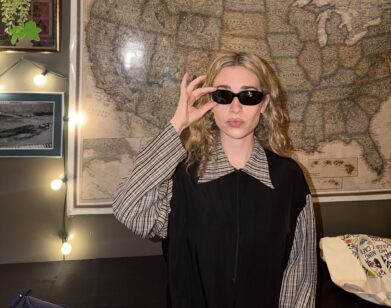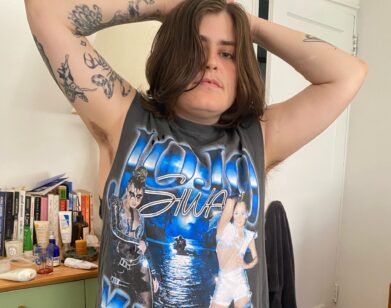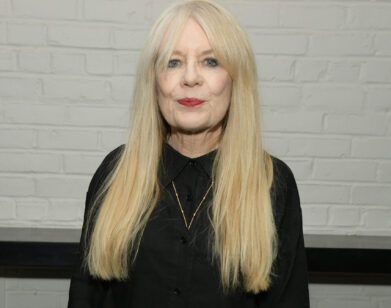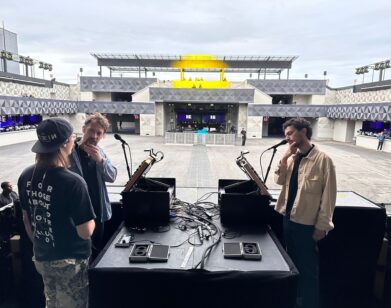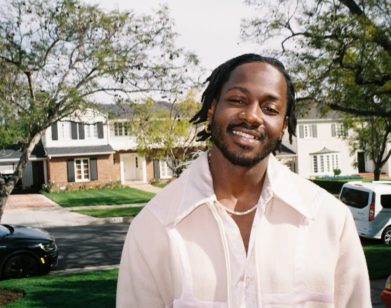music!
Blu DeTiger and Este Haim on Natural Good Looks and Backstage Bongs
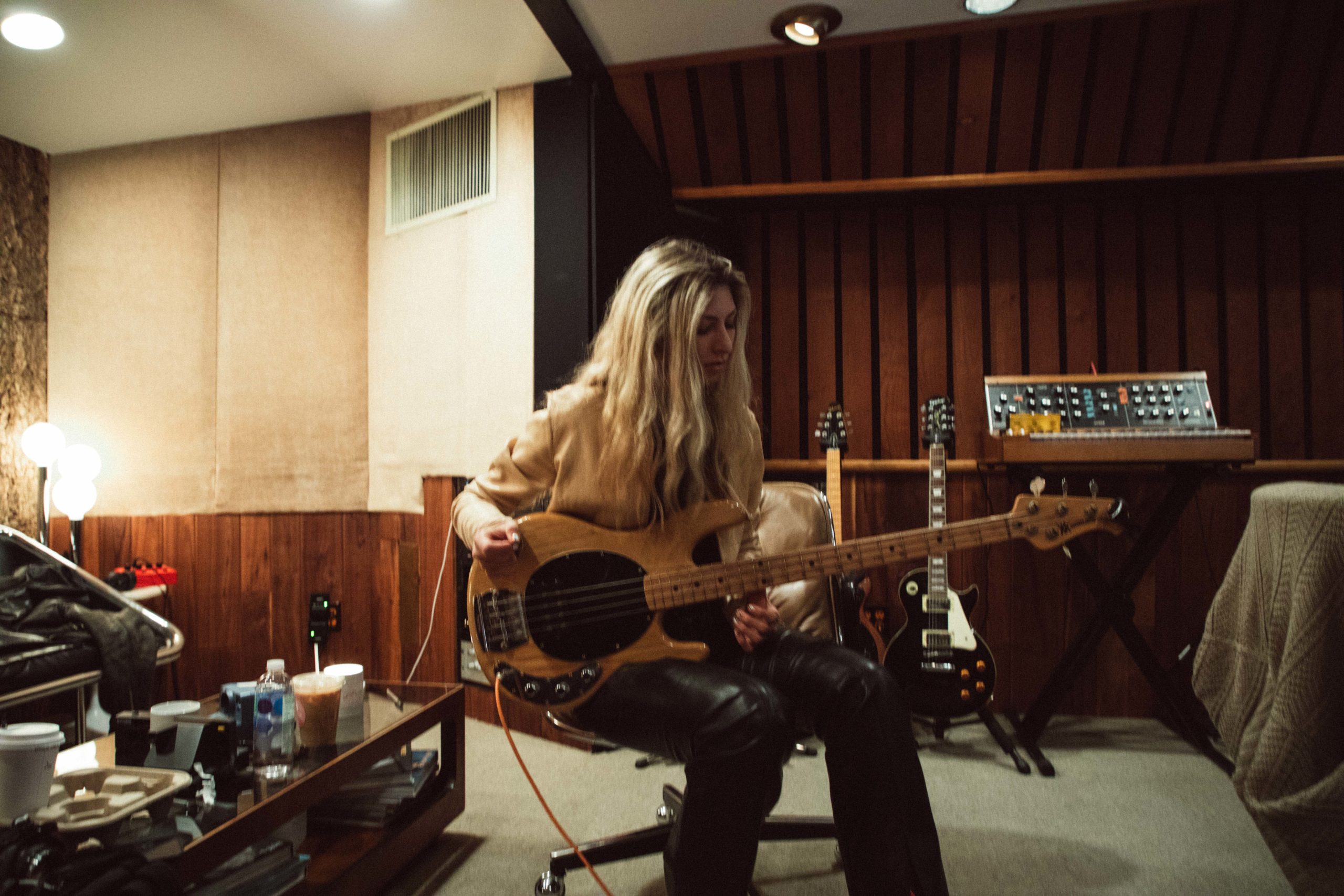
Blu DeTiger. Photo by Travis Schneider.
Blu DeTiger is striking out on her own. The 24-year-old bassist and New York native, who has worked with alt-pop acts like Caroline Polacheck, Olivia Rodrigo, Jack Antonoff, and Chromeo, always wanted to perform her own music, but even in a post-Thundercat musical landscape, solo bass players—especially women— are few and far between. While playing for other artists, DeTiger satisfied her desire to make something of her own by DJing in New York’s club circuit, carving out a niche for herself by playing her bass over various tracks, but it was her lockdown-induced turn to TikTok that paved the way for a solo career. While stuck at home, DeTiger began posting bass-heavy covers of songs by Prince, Megan Thee Stallion, and Janet Jackson, landing herself a deal with Capitol Records and more than 1.2 million followers. One of those followers is Este Haim, the eldest member of the eponymous folk rock sister act, and a bass player herself. To mark DeTiger’s eagerly anticipated upcoming show this Saturday at Red Rocks, the two bass players hopped on FaceTime to discuss their mutual fandom, touring with family, and their natural good looks.
———
BLU DETIGER: Where are you right now?
ESTE HAIM: I’m in New York! This is your city, isn’t it?
DETIGER: This is my city. I’m here, too. I just got back from London yesterday. You’re playing Madison Square Garden tomorrow?
HAIM: Yes.
DETIGER: Are you hyped? That’s my bucket list venue.
HAIM: To use a British word, I’m chuffed. I’m staying next door to the first venue we ever played in New York—the Bowery Electric. We played the Hollywood Bowl recently, and that’s my MSG.
DETIGER: I grew up two blocks away from the Bowery Hotel. I played at the Electric when I was young, too.
HAIM: It feels very full circle that we played the Bowery Electric 10 years ago, and now we’re playing MSG. It took us a decade to get here, but honestly I would do that shit all over again.
DETIGER: It sounds cheesy, but it’s about the journey.
HAIM: It’s the climb, dude.
DETIGER: I realized on this tour that every little step is so important, and I’m trying to appreciate that more, instead of being like, “When will I be huge?” I really want to come to your show tomorrow. I’m going to look for tickets.
HAIM: I will strangle you over this line if you don’t let me put you on the list. Most of my friends who would come see me play at MSG have all moved to L.A.. Also, I feel like we’re super on the same page today, hair wise.
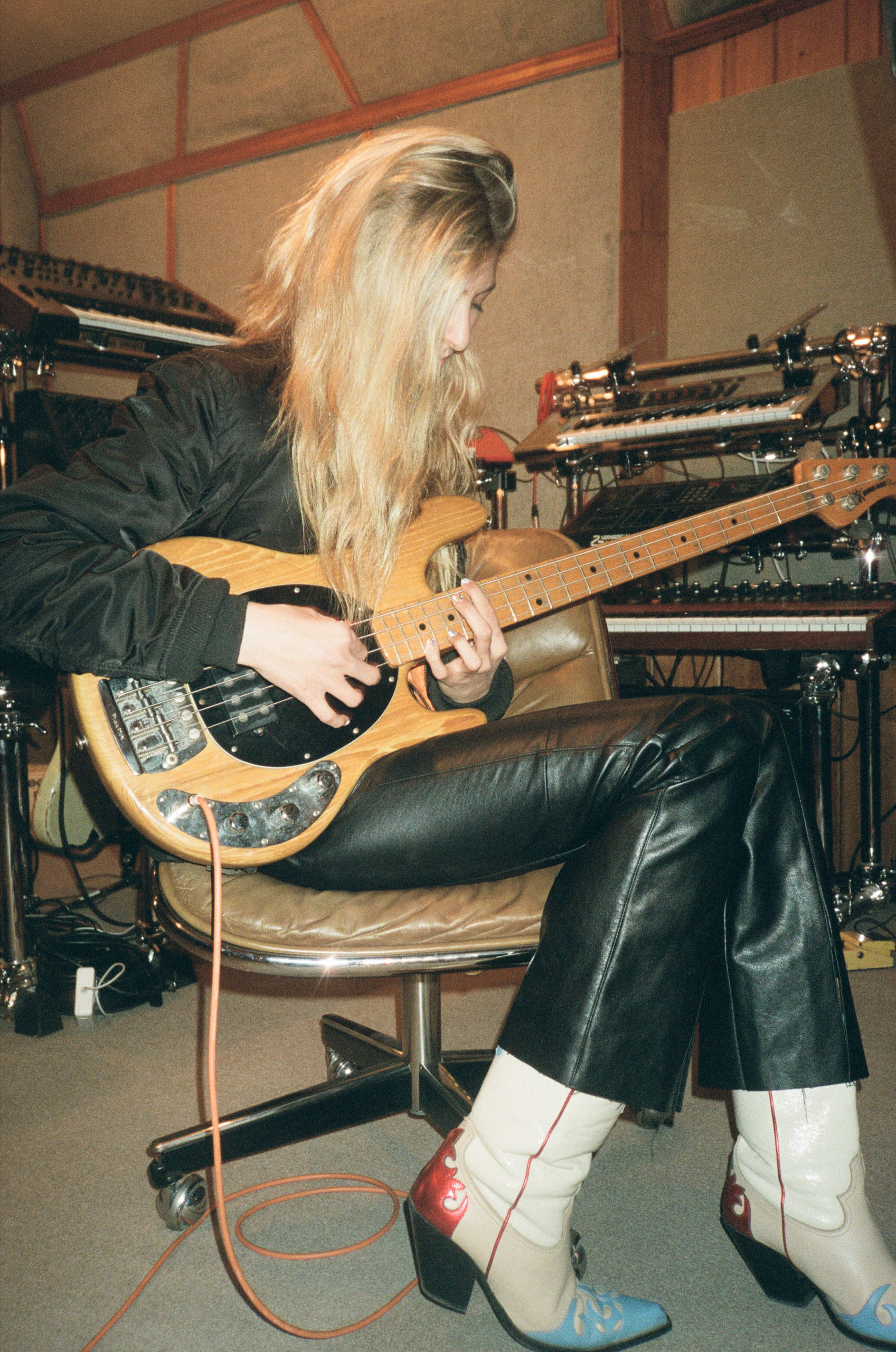
DETIGER: I like to keep it messy.
HAIM: Dude, same, this is me in my natural state. Good hair, and we have the best job in the world. We’re lucky on so many fronts.
DETIGER: I’m such a big fan, this is so cool. I don’t think we’ve ever actually met.
HAIM: I feel like we have?
DETIGER: I’ve seen you guys play like a million times, but I remember seeing you backstage at All Things Go, and I was too scared to say hi.
HAIM: I think of myself as the bitch who just wants to keep dancing, so if people find that intimidating, then I don’t know what to do. I’m not good at recognizing, vibe wise, when it’s appropriate to say hi to famous people. Maybe that’s a skill that wasn’t passed on to me in-utero, because both my sisters are good at it. But you and I have so much overlap. We’re not just women who play bass, we’re women who play bass and sing.
DETIGER: You know what’s super underrated? How hard it is to sing and play at the same time. I don’t think people comprehend how insane that is.
HAIM: It’s maybe harder for people who don’t play music to understand, because you see women play guitar and sing all the time. It’s different because of the syncopation that’s required as a bass player, and that makes it hard to vocalize at the same time.
DETIGER: Even the physicality of it. Wearing a heavy instrument on your body that weighs you down while you project is something that I’ve been working on. I play with my older brother a lot, and I make him carry my bass at the airport when we travel.
HAIM: So nice. I always wanted an older brother to tell me like what the fuck was up and what was cool.
DETIGER: He turned me onto you guys. He’s the best and he’s a great drummer. Touring with your siblings is key. I really like having the support.
HAIM: I’ve never been able to do anything other than play with my sisters, and I think it’s probably the same for you. You’re already so in sync through blood.
DETIGER: We’re super tight musically and IRL emotionally. How’s your tour going?
HAIM: I’m having the best time. I never want to stop doing this. All I kept saying during the pandemic was “I don’t know where to find joy anymore.” Touring was my only source of pure, unadulterated joy. It’s one thing to sit in a room and practice—
DETIGER: But what’s the point if no one’s listening?
HAIM: Exactly. The experience you have performing for an audience, the energy that you’re giving and receiving—that loop is addictive.
DETIGER: I just did my first little, tiny, run in Europe and it was the best thing ever. It was my first time playing over there so it was small clubs, but that’s the best. I was meeting fans afterwards, it was super cute. I think every female bass player in Manchester was at my little show.
HAIM: How much fun did you have?
DETIGER: It was so sick. I’m half Dutch, my dad’s from Holland, so I have family in Amsterdam and in London, and they came to all the shows. My 13-year-old cousin brought like 20 friends. It was so wholesome and cute. I love touring in Europe, it’s really different. We did a festival in Brighton and it was such a vibe.
HAIM: Dude, I fuck with Brighton.
DETIGER: I had such a good time, and I feel way more confident. Even if you just talk with a few people after the show, you hear where they’re coming from, why they came, and how they found you. All that stuff totally affects me. Do you have a pre-show thing you do to warm up?
HAIM: I hit my water bong for like an hour. I became obsessed with it when I first started touring, because I struggle with nodes. I really have to warm up before shows. The longest relationship I’ve ever had is with my bong. I’ve had the same one since 2012.
DETIGER: I’m learning a lot today.
HAIM: In the dressing room, I also jump rope, because it gets the blood flowing. I’m a type one diabetic, so I also have to be careful with what I eat on the road. I was never taught how to do makeup, so that’s definitely not part of my pre-show ritual.
DETIGER: I always sweat my makeup off anyways, so what’s the point? When I would tell people that I played bass growing up, they’d be like, “Do you know Este? You have to check out Este.” You’re such an inspiration.
HAIM: That is the nicest thing ever. During the pandemic, I would sit in my room and try to practice. I would go on your TikTok to watch all of your videos of you jamming out to songs for inspiration.
DETIGER: What! That’s crazy. Making those videos was a form of practicing for me, because I’d have to come up with a part and learn it. I feel like I got way better.
HAIM: You know who is really inspiring to me? Thundercat. He practices while he watches TV. I grew up doing that too. The only way my dad would allow me to watch MTV is if I played along.
DETIGER: Did you play Guitar Hero?
HAIM: No dude. My family was so against that. How old were you when you started playing bass?
DETIGER: Seven or eight.
HAIM: Me too. Was there a person when you were that age who you looked up to?
DETIGER: My brother, who’s a few years older, was playing drums, and I was like, “I want to play something, too.” Guitar felt too mainstream, I wanted to be a little different. Girls who play bass, that’s different. I picked one up and was like, “This is my thing. I’m going to do this for life.” It took me down a bunch of different paths before I started actually being an artist.
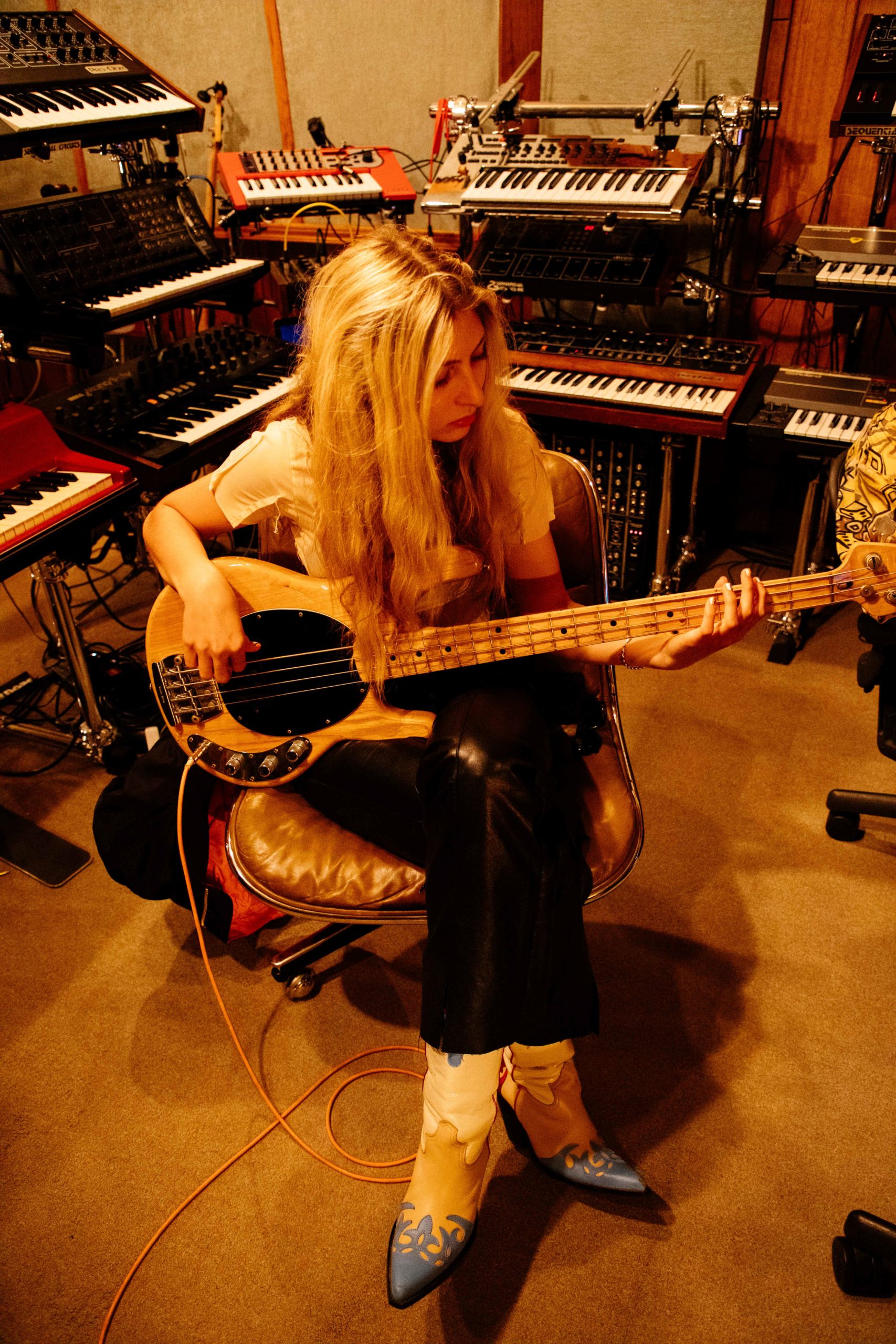
HAIM: What paths?
DETIGER: My brother and I had a band in high school, then we had a duo thing, then I was touring as a bass player for these other artists, and I got super into DJing on the side. I would bring my bass to DJ sets and shred over the tracks. I got sick of playing other people’s music, so I started making my own stuff and producing. During the pandemic, it all came together, and I started putting out more songs.
HAIM: I was sad that I couldn’t tour during that time, but it fostered this spurt of creativity, and forced me to write songs. It feels like that really was a turning point for you.
DETIGER: I’m so grateful for that time. If I didn’t start posting on Tiktok, I would probably still be playing for other people. I enjoyed that so much, but there was always a part of me that was like, “I need to be an artist and do my own thing.” At my shows, every song has a bass solo. It got to the point where my musical director was like, “I think there’s one too many bass moments,” and I was like, “No such thing.”
HAIM: [Laughs] The butteriness of the bass is so pleasing to the ear. It is a solo instrument, alert the media.
DETIGER: [Laughs] You heard it here first.

